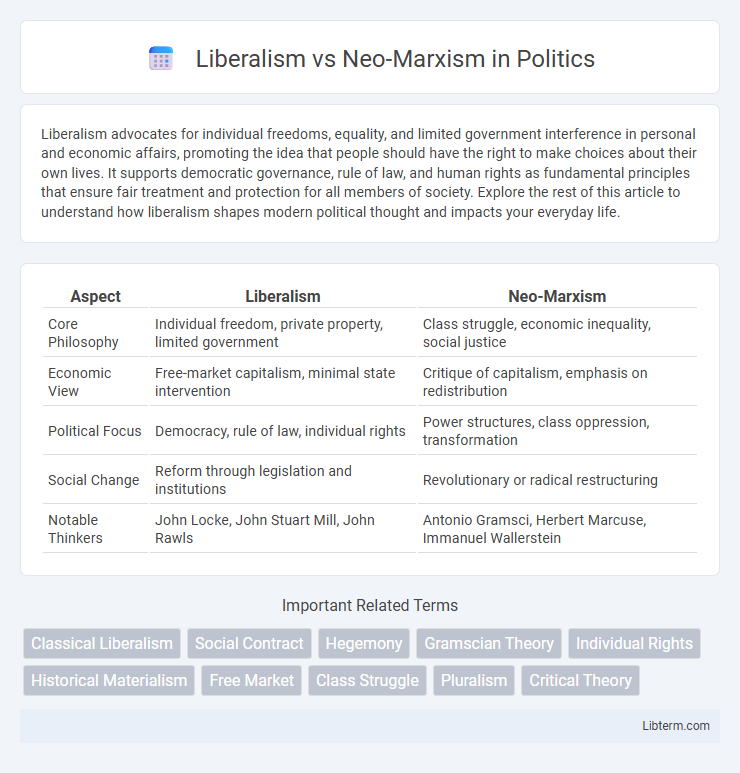Liberalism advocates for individual freedoms, equality, and limited government interference in personal and economic affairs, promoting the idea that people should have the right to make choices about their own lives. It supports democratic governance, rule of law, and human rights as fundamental principles that ensure fair treatment and protection for all members of society. Explore the rest of this article to understand how liberalism shapes modern political thought and impacts your everyday life.
Table of Comparison
| Aspect | Liberalism | Neo-Marxism |
|---|---|---|
| Core Philosophy | Individual freedom, private property, limited government | Class struggle, economic inequality, social justice |
| Economic View | Free-market capitalism, minimal state intervention | Critique of capitalism, emphasis on redistribution |
| Political Focus | Democracy, rule of law, individual rights | Power structures, class oppression, transformation |
| Social Change | Reform through legislation and institutions | Revolutionary or radical restructuring |
| Notable Thinkers | John Locke, John Stuart Mill, John Rawls | Antonio Gramsci, Herbert Marcuse, Immanuel Wallerstein |
Origins and Historical Context of Liberalism and Neo-Marxism
Liberalism emerged in the 17th and 18th centuries during the Enlightenment, advocating for individual rights, free markets, and limited government based on thinkers like John Locke and Adam Smith. Neo-Marxism developed in the mid-20th century as a critical response to classical Marxism, incorporating cultural and ideological critiques with roots in the Frankfurt School and theorists such as Antonio Gramsci and Herbert Marcuse. While liberalism arose from early capitalist societies emphasizing personal freedom and economic liberalization, Neo-Marxism evolved in response to industrial capitalism's inequalities and the limitations of traditional Marxist economic determinism.
Core Philosophical Foundations
Liberalism emphasizes individual liberty, private property, and free markets, grounded in the belief that individuals, through rational choice, can achieve progress and justice within a capitalist framework. Neo-Marxism critiques these premises by highlighting systemic class struggles and economic inequalities perpetuated by capitalist structures, advocating for transformative social change through collective action. Central to Neo-Marxism is the analysis of ideology, power relations, and material conditions as drivers of societal development, contrasting with Liberalism's faith in individual autonomy and institutional reform.
Views on Individual Freedom and Collective Rights
Liberalism emphasizes individual freedom as paramount, advocating for personal autonomy, private property rights, and limited government intervention to protect individual liberties. Neo-Marxism prioritizes collective rights, viewing social and economic inequalities as structures that restrict true freedom, arguing for systemic change to achieve collective emancipation and social justice. The tension between these ideologies centers on whether freedom is best realized through individual empowerment or through transforming societal institutions to support collective well-being.
Economic Theories and Approaches
Liberalism in economic theory emphasizes free markets, individual property rights, and minimal government intervention to promote economic growth and efficiency. Neo-Marxism critiques capitalism by highlighting class struggles, the exploitation of labor, and the inherent inequalities produced by market economies, advocating for structural changes to achieve social justice. While liberalism supports market mechanisms for wealth creation, Neo-Marxism calls for redistributive policies and systemic reforms to address economic disparities and empower the working class.
Role of the State in Society
Liberalism views the state primarily as a neutral arbiter that protects individual rights, enforces contracts, and ensures the rule of law within a free-market economy, emphasizing limited government intervention. Neo-Marxism asserts that the state functions as an instrument of class domination, maintaining capitalist structures by serving elite interests and perpetuating systemic inequalities. The debate centers on whether the state's role is to safeguard individual freedoms or to challenge and transform oppressive socio-economic relations.
Attitudes Toward Social Justice and Equality
Liberalism advocates for social justice and equality through individual rights, equal opportunity, and legal reforms within existing democratic frameworks, emphasizing market freedom and personal responsibility. Neo-Marxism critiques liberal approaches as insufficient, arguing that systemic economic inequalities and class exploitation must be addressed to achieve true social justice and equality. While liberals focus on formal equality and integration, Neo-Marxists prioritize structural change to dismantle capitalist power dynamics that perpetuate inequality.
Perspectives on Capitalism and Market Systems
Liberalism views capitalism as a driver of economic growth and individual freedom, emphasizing free markets and limited government intervention to promote efficiency and innovation. Neo-Marxism critiques capitalism for perpetuating class inequalities, exploitation, and systemic power imbalances within market systems. While liberals advocate for market regulation to ensure fairness, Neo-Marxists call for more radical restructuring or abolition of capitalist frameworks to achieve social justice.
Criticisms and Limitations of Each Ideology
Liberalism faces criticism for its emphasis on individualism, which can overlook systemic inequalities and perpetuate social stratification by prioritizing market freedoms over collective welfare. Neo-Marxism is limited by its often deterministic view of economic classes, sometimes neglecting the complexity of cultural and identity factors, and its call for revolutionary change can lead to political instability. Both ideologies struggle to fully address the balance between economic freedom and social justice, highlighting the need for more integrative approaches in political theory.
Influence on Modern Politics and Policy
Liberalism emphasizes individual rights, free markets, and democratic governance, shaping policies that promote economic freedom, civil liberties, and limited government intervention. Neo-Marxism critiques capitalist structures and power dynamics, influencing policies that address social inequality, class struggle, and advocate for state intervention to redistribute wealth. Modern politics often oscillate between these ideologies, impacting debates on welfare, regulation, and social justice reforms.
Comparative Analysis: Key Similarities and Differences
Liberalism emphasizes individual freedom, market economies, and rule of law, promoting political pluralism and private property rights, while Neo-Marxism critiques capitalist structures, focusing on class struggle and systemic inequalities rooted in economic relations. Both ideologies seek social justice but diverge in methods; liberalism advocates reform within existing institutions, whereas Neo-Marxism calls for transformative change to dismantle capitalistic exploitation. Their debates reveal contrasting views on power distribution, state roles, and economic organization, highlighting fundamental ideological divides in addressing social and economic inequalities.
Liberalism Infographic

 libterm.com
libterm.com